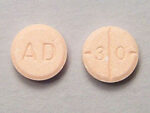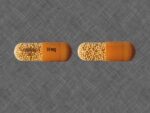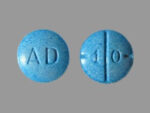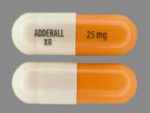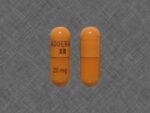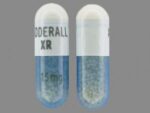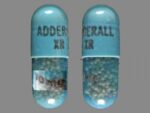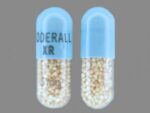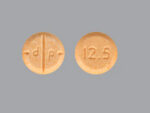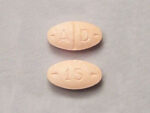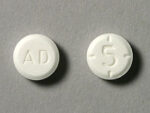Showing all 11 results
Adderall is a doctor-approved medication used to treat ADHD ( Attention Deficit Hyperactivity Disorder ) and narcolepsy. It is also used as an athletic performance enhancer, cognitive enhancer, appetite suppressant and recreationally as a euphoriant. It is a central nervous system (CNS) stimulant of the phenethylamine group.
More Facts On Adderall:
Adderall belongs to a class of medicine called Stimulants. It is the brand name of Amphetamine-Dextroamphetamine. It changes some natural substances in the brain. It is usually known as mixed Amphetamine salt, containing four different salts.
It helps increase your ability to pay attention, stay focused on an activity and control behaviour problems. It also helps organise your tasks and improve your listening skills. It affects the chemical in the brain and nerves that contribute to hyperactivity and impulse control.
Adderall was previously named Obetrol. It was approved by FDA in the year 1996 and the first generic version of Adderall was introduced on the market in 2002. It is a very commonly used medication in the U.S.A.
How To Take Adderall?
Adderall is taken exactly as prescribed by the doctor in the prescription. Any overdose or underdose or completely stopping it immediately can harm the health of a person.
Points to remember before taking Adderall are:
- Read the medication guide before taking it.
- Swallow the whole tablet. Do not crush, chew or break it.
- Take Adderall in the morning as soon as you wake up. Do not take it in the afternoon.
- Take the capsule with or without food. Taking it with food can stop stomach problems.
- If you cannot swallow the capsule, open it and sprinkle the small beads over a spoonful of applesauce. Swallow the mixture completely without chewing.
- Do not crush the beads from the capsule.
Varieties Of Adderall Available:
Adderall is available both online and offline in the market in 12 different varieties. These are
- Adderall 5 mg, a small round-shaped, white-colored tablet, AD 5 inscribed on it.
- Adderall 10 mg, a small round-shaped, sky blue-colored tablet, with AD 10 inscribed on it.
- Adderall 12.5 mg, a small round-shaped, brown-colored tablet, AD 12.5 written on it.
- Adderall 15 mg, a small oval-shaped, brown-colored tablet, AD 15 written on it.
- Adderall 20 mg, a small sphere-shaped, coffee-colored tablet, AD 20 written on it.
- Adderall 30 mg, a small round-shaped, light pink-colored tablet, with AD 30 written on it.
- Adderall XR 5 mg, a sky blue and transparent capsule, with Adderall XR 5 mg written on it.
- Adderall XR 10 mg, a sky blue-colored translucent capsule, with Adderall XR 10 mg written on it.
- Adderall XR 15 mg, a white and blue-colored capsule, with Adderall XR 15 mg written on it.
- Adderall XR 20 mg, a brown-colored capsule, with Adderall XR 20 mg written on it.
- Adderall XR 25 mg, a white and brown-colored capsule, with Adderall XR 25 mg written on it.
- Adderall XR 30 mg, a transparent and brown-colored capsule, with Adderall XR 30 mg written on it.
Composition Of Adderall:
Adderall is composed of the following ingredients:
- Adderall is a combination of amphetamine salts i.e. D-amphetamine saccharate, D-amphetamine sulfate, D, L-amphetamine sulfate, and D, L-amphetamine aspartate), with a 3: 1 ratio of D-isomer to L-isomer.
- It contains colloidal silicon dioxide, compressible sugar, corn starch, magnesium stearate, microcrystalline cellulose and saccharin sodium as inactive ingredients in it.
Dosages Of Taking Adderall:
The dosage of taking Adderall varies in children, adults and older adults. The dosage depends upon the type and severity of the condition you’re using Adderall to treat, your age, the form of Adderall you take and other medical conditions you may have.
For ADHD ( Attention Deficit Hyperactivity Disorder ):
- Children aged under 3 years are not generally recommended with Adderall.
- For children aged 3 to 5 years, a dose of 2.5 mg is initially given and may be increased according to the requirement weekly.
- For people aged 6 years and above, a dose of 5 mg is initially given and may be increased according to requirement.
- The maximum given dose can be up to 40 mg a day.
For Narcolepsy:
- For children aged between 6-12 years, a dose of 5 mg is initially given and may be increased weekly.
- For people aged above 12 years, a dose of 10 mg is initially given and may be increased up to 60 mg per day. However, a high dose can cause Insomnia.
The Function Of Adderall In The Human Body:
Adderall belongs to a class of medicines called Stimulants. It alters certain naturally-occurring chemicals in your brain by enhancing the effects of neurotransmitters like dopamine, norepinephrine, and, to a lesser degree, serotonin.
Storage:
Storage of every medicine and medicinal product is an important aspect and is different for different medications. So we need to remember some points before storing any medicine.
Points to remember before storing Adderall are:
- Store it at a temperature between 20- 25 degrees Celcius i.e. 68- 77 degrees Fahrenheit i.e. at room temperature.
- Keep it away from light and moisture.
- Keep it in a place where children cannot reach it.
- Do not store it in the bathroom.
- Do not keep it inside the refrigerator.
- Keep it in a tight, light-resistant container.
Overdose:
Overdose is a condition when a person takes an extra dose of medicine than the doctor prescribes for him/her. An overdose of any medication is dangerous to our health, so an overdose of Adderall also has some bad effects on our health.
Overdose of Adderall leads to restlessness, tremor, muscle twitches, rapid breathing, confusion, hallucinations, panic, aggressiveness, muscle pain or weakness, dark-coloured urine, depression, tiredness, nausea, vomiting, diarrhoea, stomach pain, uneven heartbeats, feeling light-headed, fainting, seizure (convulsions), or coma.
Missed Dose:
Taking medicine at an improper time and irregularly leads to a missed dose. People after missing a dose usually take a double dose which leads to overdose. In case you miss a dose, do not panic. Take the dose immediately or continue with your regular dose or consult your doctor.
Withdrawal Symptoms:
Symptoms that are shown when any medicine is stopped suddenly or accidentally are called withdrawal symptoms. All anti-ADHD pills have their withdrawal symptoms, hence Adderall. The symptoms are depression, irritability, mood change, fatigue, nausea, stomach ache and vomiting.
Side Effects Of Using Adderall:
Any medicine when used improper way shows dangerous adverse effects hence Adderall shows. It shows both common and serious adverse effects.
Common Side Effects:
The common side effects are:
- Lack of appetite
- Dry mouth
- Trouble sleeping
- Headache
- Stomach pain
- Constipation
- Nausea
- Weight loss
- Anxiety
- Dizziness
Serious Side Effects:
The serious side effects are:
- High blood pressure
- Rapid heartbeat
- Heart attack
- Heart stroke
- Depression
- Hallucination
- Aggressive behaviour
- Irritability
- Blurred vision
- Severe allergic reaction
- Muscle breakdown
Alternatives For Adderall:
Finding the exact alternative is not possible, but there are some similar medications which are prescribed instead of Adderall.
Natural Substitute:
The natural substitutes are:
- Insomnia
- Melatonin
- Vitamin B-Complex
- Magnesium
- Chamomile
- Valerian extracts
Medicinal Substitute:
The medicinal substitutes are:
- Vyvanse
- Ritalin
- Concerta
- Strattera
- Intuniv
- Kapvay
Precautions And Warnings:
There are some precautions which are needed to be taken by patients suffering from ADHD before taking Adderall. These are
- Test whether you are allergic to Adderall or any other Stimulants.
- Describe both your physician and mental history before the doctor.
- Tell your doctor if you were drug abused in the past as Adderall is habit forming.
- Consult your doctor if you have diabetes as it can result in vision loss.
- Test whether you have any kidney disease, liver disease, glaucoma, lung/ breathing problems or mental disorder.
- Adderall should not be given to patients having hypertension and other cardiovascular diseases.
- Using Adderall while pregnant can harm your unborn baby.
- Breastfeeding mothers are advised to consult a doctor and follow the advice.
Other Food And Medicine Interactions:
One should make it clear to the doctor if he/she is taking any other medicines before the doctor prescribes Adderall as it can be dangerous if some specific medicines are taken with it.
Medicine Interaction:
Do not take these medicines with Adderall:
- Isocarboxazid
- Linezolid
- Metaxalone
- Methylene blue
- Moclobemide
- Phenelzine
- Procarbazine
- Rasagiline
- Safinamide
- Selegiline
- Tranylcypromine
Food And Beverage Interaction:
Do not take these food items and beverages with Adderall:
- Acidic foods
- Fruit juice
- Vitamin C supplements
- Caffeine
- Alcohol
- Cigarette
Important:-
- Alcohol leads to drowsiness. So taking alcohol along with Adderall can cause severe drowsiness, dizziness, tiredness and body imbalance.
- Cigarette smoking with Adderall may decrease the effectiveness of the drug.
- Acidic food increases the blood levels and effects of Adderall.
Frequently Asked Questions
Is Adderall the first choice medicine to treat ADHD?
Yes, Adderall is considered a first-choice treatment option for ADHD. It is the most commonly used medication to treat ADHD.
Is Adderall addictive in nature?
Yes, Adderall is addictive when overdosed or taken for fun purposes.

